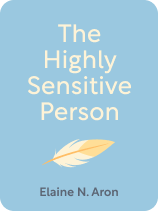

This article is an excerpt from the Shortform book guide to "The Highly Sensitive Person" by Elaine Aron. Shortform has the world's best summaries and analyses of books you should be reading.
Like this article? Sign up for a free trial here.
What is high sensitivity? Is high sensitivity an acquired or a genetic trait?
High sensitivity is a trait characterized by a higher level of sensitivity than is found in the general population. While it can’t be developed, your environment can impact your sensitivity, and a particularly difficult life and childhood can make you suppress your sensitivity until you seem to not have it anymore.
Keep reading to learn about the origins of the high sensitivity trait, according to psychotherapist Elaine Aron.
Where Does High Sensitivity Come From?
What is high sensitivity, and where does it come from? According to Elaine Aron, the author of The Highly Sensitive Person, HSPs have existed throughout all of recorded history. Aron says high sensitivity probably developed as an evolutionary survival trait. Individuals who were more attuned to their environment and who were more likely to pause, take in their surroundings, and think through their actions gained a survival advantage and were able to help their groups survive better as well. Their tendency to learn from past experiences to inform their future actions also provided a survival advantage to themselves and their groups.
(Shortform note: Aron has added in other writing that HSPs were not only responsible for the survival of the human species in the past but are also essential for our survival in the future. She argues that HSPs are needed to observe and reflect on the actions of aggressive world leaders and to guide the species to choose cooperation over competition, which may become even more vital than it was during our earlier evolution.)
Aron says in all higher animal species, there are individuals that show traits of high sensitivity, but they make up a minority of the population. Aron suggests this is because there are also some disadvantages, such as a tendency to overgeneralize past experiences—for example, if they got sick from eating a type of berry once, they might avoid that berry from then on. But if the sickness was a coincidence then they’re missing out on a useful source of nutrition.
(Shortform note: Other species can also have highly sensitive individuals—for example, dogs. As with humans, a dog’s sensitivity can impact its behavior and personality. Highly sensitive dogs are more reactive to negative communication and punishment and may need calmer environments than other dogs. Highly sensitive people often do well with pets, but consider whether you’re attending to your dog’s sensitivity needs as well as your own. Behavior problems may be a sign that your HSD—highly sensitive dog—is overstimulated.)
Aron describes a distinction between two classes of people throughout history: people like warriors and conquerors who sought expansion and competition, and people like advisors, judges, and priests whose sensitivity allowed them to act as the voice of caution, often reining in the aggressive tendencies of the other class. She suggests that those of the conqueror class were more likely to die because of their boldness and tendency to act quickly, and that’s why we evolved to have more of them than people of the sensitive class.
(Shortform note: While the less sensitive class of people may be more likely to die from risky actions they take, research suggests that highly sensitive people may be more susceptible to suicidal ideation and death from suicide. This may not have a significant statistical impact on the ratio of HSPs to non-HSPs but may reflect the ways in which life is difficult for them in different ways than it is for non-HSPs.)
How an HSP’s Environment Affects Their Trait
HSPs tend to be more affected by their childhood experiences in general. HSPs with poor childhood experiences tend to have poorer life outcomes than non-HSPs with poor childhood experiences, while HSPs with positive childhood experiences often have better outcomes than non-HSPs with positive childhood experiences. This suggests that while sensitivity is an inborn trait, its impact on our lives is largely dependent on environment, especially in childhood.
(Shortform note: Some research suggests that high sensitivity in children may cause strain in their relationships with their parents, especially if the parent is unaware of the child’s sensitivity. Parents should do their best to educate themselves about their child’s needs so they can accommodate their sensitivity and avoid unnecessary conflicts that may contribute to poorer outcomes for the child.)

———End of Preview———
Like what you just read? Read the rest of the world's best book summary and analysis of Elaine Aron's "The Highly Sensitive Person" at Shortform.
Here's what you'll find in our full The Highly Sensitive Person summary:
- The strengths and challenges associated with being a highly sensitive person
- How to manage your sensitivity in your personal, social, and professional life
- Why you should stop labeling yourself as "shy"






